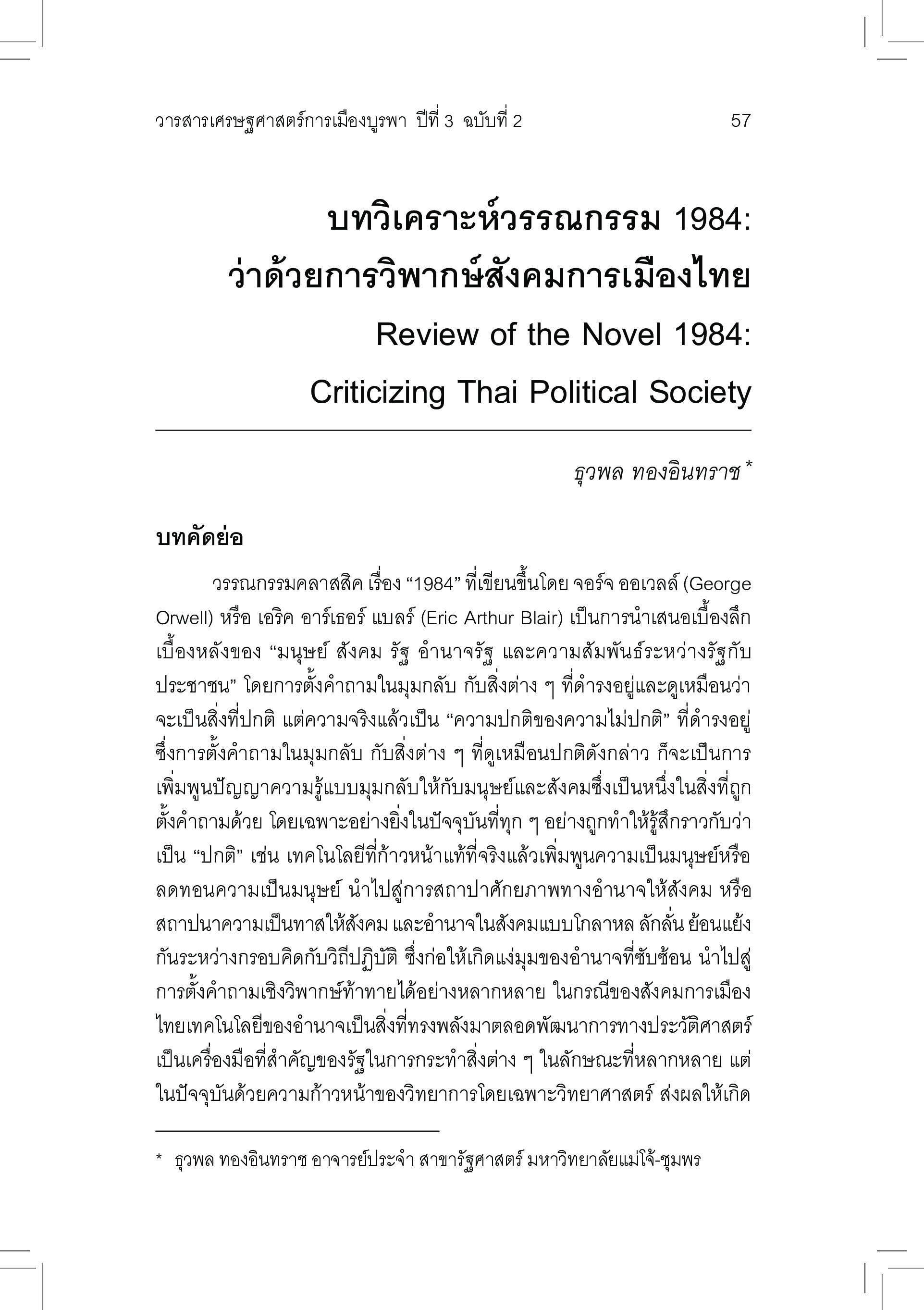Review of the Novel 1984: Criticizing Thai Political Society
Keywords:
Novel 1984, Criticize, Thai PoliticsAbstract
The classic novel ‘1984’, written by George Orwell (real name Eric Arthur Blair), profoundly depicts “humanity, society, a state, state power and the relationship between state and public” through reverse questioning of all things that seem to be normal, but in reality reveals the “normality of abnormality”. Such a reverse order of questioning should, improves knowledge, improve knowledge, from an opposing perspective, of humanity and society, which is part of the subject being addressed in the novel. Especially nowadays that things are being made to feel as if it is "normal", as technology advances, in fact, enhance or diminish the humanity of human beings. Leading to a potential power, social status or the establishment of a slave society. And the social chaos in contradictory ways overlap between the concept and practice. Which contributes to the aspects of the complex. Leads to a question from a range of critical challenges. In the case of Thailand political power of technology is a powerful all historical development. Is a key tool of the state to do things in a variety of styles. But now with the advancement of science, especially science. Resulting in the establishment of the power of technology in various formats and channels of power relations between the state and people. In creating the appearance of power to the people. However, such power relations. There are two important aspects to the concrete and the abstract is power. The political power in Thailand is familiar with the law, which appears as a noun pronounced. But are not familiar with and recognize the power of another culture is the ideal living and operating base through major institutions of society. Since there is no realistically complex and pressing force. And power in the face of such an abstraction. As the most powerful and effective social politics in modern Thailand.
References
จันทนี เจริญศรี. (2545). โพสต์โมเดิร์นกับสังคมวิทยา. (พิมพ์ครั้งที่ 2). กรุงเทพฯ: วิภาษา.
จักษ์ พันธ์ชูเพชร. (10 สิงหาคม 2552). “มิเชล ฟูโกต์: วาทกรรมและปฏิบัติการ”. วันที่ค้นข้อมูล 15 พฤษภาคม 2558, เข้าถึงได้จาก http://www.ajarnjak.
ชัยวัฒน์ สถาอานันท์. (2528). การเมืองมนุษย์: รัฐศาสตร์ทวนกระแส. กรุงเทพฯ: ดอกหญ้า.
ชัยอนันต์ สมุทวณิช. (2552). รัฐ. (พิมพ์ครั้งที่ 3). กรุงเทพฯ: สถาบันนโยบายศึกษา.
ชาญชัย อาจินสมาจาร. (2551). ทฤษฎีการบริหารตามแนวคิดปราชญ์ตะวันตก. กรุงเทพฯ: ปัญญาชน.
ไชยรัตน์ เจริญสินโอฬาร. (2544). รัฐศาสตร์แนววิพากษ์. (พิมพ์ครั้งที่ 2). กรุงเทพฯ: มหาวิทยาลัย ธรรมศาสตร์.
_______. (2549). วาทกรรมการพัฒนา: อำนาจ ความรู้ ความจริง และความเป็นอื่น. (พิมพ์ครั้งที่ 4). กรุงเทพฯ: วิภาษา.
_______. (2545 ก). ขบวนการเคลื่อนไหวทางสังคมรูปแบบใหม่. (พิมพ์ครั้งที่ 2). กรุงเทพฯ: วิภาษา.
_______. (2545 ข). สัญวิทยา, โครงสร้างนิยม, หลังโครงสร้างนิยม, กับการศึกษารัฐศาสตร์.กรุงเทพฯ: วิภาษา.
_______. (2551). ภาษากับการเมือง/ความเป็นการเมือง. กรุงเทพฯ: โครงการตำราและสิ่งพิมพ์ คณะรัฐศาสตร์ มหาวิทยาลัยธรรมศาสตร์.
_______. (2554). แนะนำสกุลความคิดหลังโครงสร้างนิยม. กรุงเทพฯ: สมมติ.
ทองกร โภคธรรม และ นพพร ประชากุล. (2547). ร่างกายใต้บงการ. กรุงเทพฯ: โครงการจัดพิมพ์คบไฟ.
ธเนศ วงศ์ยานนาวา. (18 ตุลาคม 2549). “รัฐประหารกับความชอบธรรมทางการเมือง”. วันที่ค้นข้อมูล 15 พฤษภาคม 2558, เข้าถึงได้จาก http://invisiblenews.exteen.com/20061018/entry.
_______. (2552). ความไม่หลากหลายของความหลากหลายทางวัฒนธรรม. กรุงเทพฯ: สมมติ.
_______. (2552). 1986:เชิงอรรถการปฏิวัติ. กรุงเทพฯ: สมมติ.
_______. (2553). ความรัก ความรู้ ความตาย. กรุงเทพฯ: ศยาม.
_______. (2554). ความสมเหตุสมผลของความชอบธรรม(การครอบงำ). กรุงเทพฯ: คณะรัฐศาสตร์ มหาวิทยาลัยธรรมศาสตร์.
ธีรยุทธ บุญมี. (2550). ความคิดสองทศวรรษ ธีรยุทธ บุญมี. กรุงเทพฯ: มติชน.
_______. (2551). มิเชล ฟูโกต์. กรุงเทพฯ: วิภาษา.
นิติ ภวัครพันธุ์. (2550). “มือถือ: ปัจจัยที่ห้าของแรงงานพม่าในเมืองชายแดน”. ใน ศูนย์มานุษยวิทยาสิรินธร (องค์การมหาชน). สู่พรมแดนความรู้เรื่องวัฒนธรรมบริโภค. กรุงเทพฯ: ศูนย์มานุษยวิทยาสิรินธร.
ศิริพงษ์ ลดาวัลย์ ณ อยุธยา. (2551). แนวความคิดและทฤษฎีทางรัฐประศาสนศาสตร์. (พิมพ์ครั้งที่2).เชียงใหม่: ธนุชพริ้นติ้ง.
สรวิศ ชัยนาม. (2552). จักรวรรดิอเมริกา ประวัติศาสตร์แบบทวนกระแส อัตลักษณ์ ชีวอำนาจ. กรุงเทพฯ: โครงการหนังสือชุด ความสัมพันธ์ระหว่างประเทศศึกษา ภาควิชาความสัมพันธ์ระหว่างประเทศ คณะรัฐศาสตร์ จุฬาลงกรณ์มหาวิทยาลัย.
สายพิณ ศุพุทธมงคล. (2545). คุกกับคน อำนาจและการต่อต้านขัดขืน. (พิมพ์ครั้งที่ 2).กรุงเทพฯ: มหาวิทยาลัยธรรมศาสตร์.
เสนีย์ คำสุข. (2548). ”การศึกษารัฐศาสตร์แนวทางอำนาจ”. ใน เอกสารการสอนชุดวิชาหลักและวิธีการศึกษาทางรัฐศาสตร์. นนทบุรี: สำนักพิมพ์มหาวิทยาลัยสุโขทัยธรรมาธิราช.
อมร รักษาสัตย์ และคณะ. (2543). ประชาธิปไตย อุดมการณ์ หลักการ และแบบอย่างการปกครองหลายประเทศ. (พิมพ์ครั้งที่ 2). กรุงเทพฯ: จุฬาลงกรณ์มหาวิทยาลัย.
อานันท์ กาญจนพันธุ์. (2552). คิดอย่างมิเชล ฟูโกต์ คิดอย่างวิพากษ์ จากวาทกรรมของอัตบุคคลถึงจุดเปลี่ยนของอัตตา. เชียงใหม่: สำนักพิมพ์มหาวิทยาลัยเชียงใหม่.
อภิญญา เฟืองฟูสกุล. (2546). อัตลักษณ์. กรุงเทพฯ: คณะกรรมการสภาวิจัยแห่งชาติ สาขาสังคมวิทยา สำนักงานคณะกรรมการวิจัยแห่งชาติ.
_______. (แปล). (2549). หลังโครงสร้างนิยมฉบับย่อ. กรุงเทพฯ: ศูนย์มานุษยวิทยาสิรินธร.
Althusser, L. (1971). Lenin and Philosophy and Other Essays. New York: Monthly Review Press.
Miliband, R. (1969). The State in Capitalist Society. London: Weidenfeld and Nicolson.






